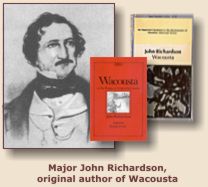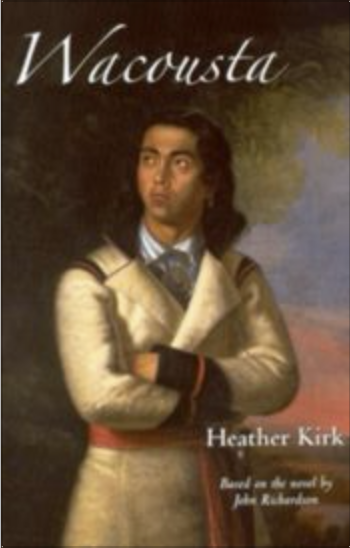 |
|
|
|
| |
Teachers |
| In this section: |
- Mazo de la Roche among Important Canadian Writers
- John Richardson's opening of Wacousta.
- Heather Kirk's opening of Wacousta.
- Some Sources for Learning about Poland and the Solidarity Uprising.
|
|
| |
|
|
|
| |
Mazo de la Roche among Important Canadian Writers |
Canadian Literature: Some Important Women Writers |
Frances Brooke (1723-1789)
Susanna Moodie (1803-1885)
Catherine Parr Traill (1802-1899)
Anna Jameson (1794-1860)
Sarah Jeanette Duncan (1861-1922)
Nellie McClung (1873-1951)
L.M. Montgomery (1874-1942)
Mazo de la Roche (1879-1961)
Ethel Wilson (1888-1980)
Laura Goodman Salverson (1890-1970)
Gabrielle Roy (1909-1983)
Dorothy Livesay (1909-1996)
Margaret Laurence (1926-1987)
Joy Kogawa (1935-
Adele Wiseman (1928-1992)
Carol Shields (1935-2003)
Margaret Atwood (1939- |
 |
Canadian Literature 1920-1950: Some Important Writers |
Charles G.D. Roberts (1860-1943)
Duncan Campbell Scott (1862-1947)
Stephen Leacock (1869-1944)
Frederick Philip Grove (1879-1948)
Mazo de la Roche (1879-1961)
E.J. Pratt (1882-1964)
Grey Owl or Archibald Stansfeld Belaney (1888-1938)
Morley Callaghan (1903-1990)
Thomas Raddall (1903-1994)
Earle Birney (1904-1995)
Hugh MacLennan (1907-1990)
Sinclair Ross (1908-1996)
Gabrielle Roy (1909-1983)
Irving Layton (1912-2006)
Robertson Davies (1913-1995)
W.O. Mitchell (1914-1998)
Mordecai Richler (1931-2001) |
|
| Top |
|
John Richardson’s Wacousta
|
The original text of the opening paragraph of Wacousta with some unnecessary words underlined and some abstract words boldfaced. |
 It was during the midnight watch, late in September, 1763, that the English garrison of Détroit, in North America, was thrown into the utmost consternation by the sudden and mysterious introduction of a stranger within its walls. The circumstance at this moment was particularly remarkable; for the period was so fearful and pregnant with events of danger, the fort being assailed on every side by a powerful and vindictive foe, that a caution and vigilance of no common kind were unceasingly exercised by the prudent governor for the safety of those committed to his charge. A long series of hostilities had been pursued by the North-American Indians against the subjects of England, within the few years that had succeeded to the final subjection of the Canadas to her victorious arms; and many and sanguinary were the conflicts in which the devoted soldiery were made to succumb to the cunning and numbers of their savage enemies. In those lone regions, both officers and men, in their respective ranks, were, by a communionship of suffering, isolation, and peculiarity of duty, drawn towards each other with feelings of almost fraternal affection; and the fates of those who fell were lamented with sincerity of soul, and avenged, when opportunity offered, with a determination prompted equally by indignation and despair. This sentiment of union, existing even between men and officers of different corps, was, with occasional exceptions, of course doubly strengthened among those who fought under the same colours, and acknowledged the same head; and, as it often happened in Canada, during this interesting period, that a single regiment was distributed into two or three fortresses, each so far removed from the other that communication could with the utmost facility be cut off, the anxiety and uncertainty of these detachments became proportioned to the danger with which they knew themselves to be more immediately beset. The garrison of Détroit, at the date above named, consisted of a third of the _____regiment, the remainder of which occupied the forts of Michillimackinac and Niagara, and to each division of this regiment was attached an officer’s command of artillery. It is true that no immediate overt act of hostility had for some time been perpetrated by the Indians, who were assembled in force around the former garrison; but the experienced officer to whom the command had been intrusted was too sensible of the craftiness of the surrounding hordes to be deceived, by any outward semblance of amity, into neglect of those measures of precaution which were so indispensable to the surety of his trust. It was during the midnight watch, late in September, 1763, that the English garrison of Détroit, in North America, was thrown into the utmost consternation by the sudden and mysterious introduction of a stranger within its walls. The circumstance at this moment was particularly remarkable; for the period was so fearful and pregnant with events of danger, the fort being assailed on every side by a powerful and vindictive foe, that a caution and vigilance of no common kind were unceasingly exercised by the prudent governor for the safety of those committed to his charge. A long series of hostilities had been pursued by the North-American Indians against the subjects of England, within the few years that had succeeded to the final subjection of the Canadas to her victorious arms; and many and sanguinary were the conflicts in which the devoted soldiery were made to succumb to the cunning and numbers of their savage enemies. In those lone regions, both officers and men, in their respective ranks, were, by a communionship of suffering, isolation, and peculiarity of duty, drawn towards each other with feelings of almost fraternal affection; and the fates of those who fell were lamented with sincerity of soul, and avenged, when opportunity offered, with a determination prompted equally by indignation and despair. This sentiment of union, existing even between men and officers of different corps, was, with occasional exceptions, of course doubly strengthened among those who fought under the same colours, and acknowledged the same head; and, as it often happened in Canada, during this interesting period, that a single regiment was distributed into two or three fortresses, each so far removed from the other that communication could with the utmost facility be cut off, the anxiety and uncertainty of these detachments became proportioned to the danger with which they knew themselves to be more immediately beset. The garrison of Détroit, at the date above named, consisted of a third of the _____regiment, the remainder of which occupied the forts of Michillimackinac and Niagara, and to each division of this regiment was attached an officer’s command of artillery. It is true that no immediate overt act of hostility had for some time been perpetrated by the Indians, who were assembled in force around the former garrison; but the experienced officer to whom the command had been intrusted was too sensible of the craftiness of the surrounding hordes to be deceived, by any outward semblance of amity, into neglect of those measures of precaution which were so indispensable to the surety of his trust.
|
|
|
Heather Kirk’s Wacousta |
Heather Kirk’s version of the opening pages of Wacousta. All the information in these pages can be found in the first chapter of Wacousta. |
 The alarm bell inside the apartment of Colonel de Haldimar was clanging loudly. The colonel himself was pulling the rope. The alarm bell inside the apartment of Colonel de Haldimar was clanging loudly. The colonel himself was pulling the rope.
Two sentinels outside the governor’s door lowered their muskets to the charge and stood immobile.
“Where is he?” roared the colonel, rushing
out his door and running to the middle of the parade ground in his dressing gown, a lamp in one hand and a sword in the other. His face was pale. His grey hair was standing on end wildly.
“Who does your honour mean?” asked one of the guards.
“The man—the stranger—who just passed you.”
“Not a living soul has passed us since our watch began, your honour,” insisted the second guard. “We’ve been here about an hour.”
“Impossible,” barked the governor. “You’ve been asleep at your posts or you would have seen him.”
“I swear, your honour,” the first guard began to protest.
“Silence! Walk about!” the governor commanded.
As the guards shouldered their muskets again and resumed their circumscribed, interlaced pacing in front of his door, Colonel de Haldimar turned his attention to the rest of the now bustling but voiceless garrison, awakened by his urgent signal. Despite the darkness, he could make out the running forms of uniformed men already on the parade ground: these were the guard. Above, lights flashing on and off told him that those off duty were dressing rapidly. The occasional opening and shutting of pans and ringing of ramrods told him they were arming themselves and testing the efficiency of their muskets.
Did I dream the monster hissing threats in my ear? the colonel wondered as his men assembled. Will the men think I am a fool? No! He was really in my apartment. But I can’t stay out here in my dressing gown.
Colonel de Haldimar retreated to his apartment and sent his orderly for the next in command.
“Major Blackwater,” the governor said seconds later to a short, thickset officer in a grey, military-undress uniform, “we have traitors in the fort. Search everywhere for a stranger, an enemy.”
“Good heavens!” exclaimed Major Blackwater. “An Indian? That’s impossible! How could he enter a place so vigilantly guarded?”
“Don’t ask how, Blackwater,” returned Colonel de Haldimar. “It’s enough the fellow was standing where you are now less than ten minutes ago. Search everywhere. Every nook and cranny. Every empty cask. And station a number of extra sentinels along the ramparts.”
The major saluted and withdrew.
Soon soldiers were dispersed in small groups throughout the interior of the fort. |
| Top |
|
Some Sources for Learning about Poland
and
the Solidarity Uprising |
Ascherson, Neal. The Struggles for Poland. New York: Random House, 1987.
Bernstein, Carl and Marco Politi. His Holiness: John Paul II and the History of Our Time. New York: Penguin Books, 1996.
Davies, Norman. Heart of Europe: The Past in Poland’s Present. Rev. ed. New York: Oxford U P, 2001.
---. God’s Playground: A History of Poland. 2 vols. Rev. ed. Oxford: Oxford U P, 2005.
Garton Ash, Timothy. The Polish Revolution: Solidarity. New Haven: Yale U P, 2002.
Gorecki, Henryk. Symphony No. 3. Op. 36. Symphony of Sorrowful Songs. 1976.
Kaufman, Michael T. Mad Dreams, Saving Graces. Poland: A Nation in Conspiracy. New York: Random House, 1989.
Krok-Paszkowski, Jan, ed. Portrait of Poland. Preface by Czeslaw Milosz. Photographs by Bruno Barbey. London: Thames and Hudson, 1982.
Lukas, Richard C. The Forgotten Holocaust: The Poles Under German Occupation 1939-1944. 2nd rev. ed. Forward by Norman Davies. New York: Hippocrene Books, 1997.
Penn, Shana. Solidarity’s Secret. Ann Arbor, MI: U of Michigan Press, 2005.
Tischner, Jozef. The Spirit of Solidarity. San Francisco: Harper & Row, 1984.
Wajda, Andrzej, director. Kanal, Man of Marble, Man of Iron. [Motion pictures.]
Walesa, Lech. A Way of Hope. New York: Henry Holt, 1987.
---. The Struggle and the Triumph. New York: Arcade Publishing, 1992.
Weigel, George. Witness to Hope: The Biography of Pope John Paul II. New York: Harper Collins, 1999. |
|
| Top |
|
| |
|
 |
|
|
| |
|
|
 |